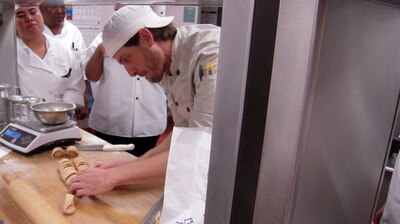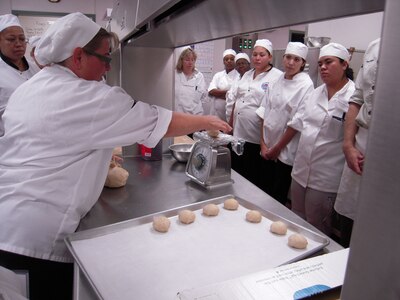
Chef Safa Hamze watched with consternation as a Denver Public Schools food service worker squeezed a wad of whole wheat dough in her fists, then pinched off the tops that oozed out between her thumb and forefinger, setting each tan globule on a scale to make sure it weighed the requisite 1.5 ounces.
One by one, the little dough balls filled up a baking sheet, eventually to become dinner rolls. Soon, they would go in the oven at Academia Ana Marie Sandoval in northwest Denver.
“Do the dinner rolls have to be round?” he asked. “Because, you know, you can do it a lot faster if you make them square.”
Then Hamze, a one-time middle school math teacher who is now head baker at Whole Foods Rocky Mountain Bake House, did a little calculation aloud.
“You put 70 rolls on a pan at 1.5 ounces each. But instead, you could just roll out 7.5 pounds of dough and put on the pan, then slice it in squares and make the rolls pull-aparts,” he said. “They’ll bake together in such a way that you can just pull a roll off.”
Around the kitchen, heads nodded as mental light bulbs went on. The others could immediately see how much faster Hamze’s way would be over the traditional method, dubbed the “kill-the-chicken” technique.
Later that morning, Annette Martinez, who has been cooking for Denver schoolchildren for the past 23 years, was ecstatic with this newfound knowledge.
“Oh, slicing is soooo much better than pinching,” said Martinez, a food service worker at South High School. “He’s teaching us some real time savers. And that leaves us more time to focus on what we need to do.”
Back to school early for food workers
Last week, 120 workers – about a third of total DPS lunchroom staff – started a three-week “boot camp” in which they’ll learn lots more tips and techniques about scratch cooking, a skill many of them have never developed.

They’re being tutored by local professional chefs such as Hamza.
When school starts in August, 29 DPS kitchens will have abandoned most processed foods and will be regularly be turning out homemade baked goods, meats and vegetable dishes. Within three years, all DPS school lunchrooms will follow suit.
It’s the largest commitment to returning to scratch cooking in schools in the state, if not the country, said Leo Lesh, director of food and nutrition services for the district.
“I think we’re ahead of the pack,” Lesh said.
“A few districts may try this in one or two schools, but we’re taking off a pretty big chunk at one go. And I’ve not heard of anyone having a three-week training program like this.”
Back-to-scratch a national trend
The DPS effort parallels efforts in many smaller school districts to return to scratch cooking.
LiveWell Colorado is sponsoring week-long “culinary boot camps” for school food service personnel across the state. Nationwide, a movement for schools to abandon heat-and-serve processed foods and return to the homemade meals Baby Boomers remember is gathering steam.
“I’m surprised at how quickly this movement has taken root,” said Lesh. “It seems like overnight everyone has gotten concerned about the processed foods served in schools. Before, only food service directors were concerned.”
Most school lunchroom fare was made from scratch 30 years ago, he said. Then things changed.
“Food safety standards became more prevalent, and it was just easier to buy pre-packaged stuff,” he said. “The liability was less. And in the early ’80s everybody was running to fast food restaurants, and that’s what the kids wanted. We got into a lot of branded products like Subway pizza and Taco Bell burritos.”
Some new schools were built without real kitchens, since processed foods could simply be reheated. Of 140 DPS schools, 42 have no kitchens so food must be made elsewhere and transported to them.
Concern about childhood obesity sparks change
But about five years ago, things began to change again as rumblings of concern grew about widespread childhood obesity.
DPS responded by removing all its fryers, and began baking French fries. The district started bringing in more fresh fruits and vegetables, opening more salad bars.

The district also embraced a policy of including at least one vegetarian selection daily, and of using produce from school gardens whenever possible.
“It was clear that we really wanted to go back to scratch cooking again,” Lesh said. “But then we faced the talent issue. Who could do those kind of things? People don’t cook at home anymore, and they haven’t taught their kids to cook. And there are no more home ec classes.
“We decided if we wanted to do this, we would have to develop our own training classes because we just can’t find the people who already have these skills who want to work for us.”
Back in the kitchen at Academia Ana Marie Sandoval, Katherine Culpepper is one of those people. She’s brand new to the district – doesn’t yet even know which school she’ll be assigned to in the fall.
But she’s the mother of six children and has raised seven more in addition to her own, and she knows a thing or two about cooking. “I know you can still have good quality food, made fast, if you work hard,” she said.
Martinez, the veteran with 23 years experience, remembers what school kitchens used to be like, and she’s glad to see a return to that.
“It’s back to the basic again, like we used to do,” she said. “It’ll be hard to go back to cooking again, but it’s good. It’s so much better for the children, and the food will be so much better.”
Regina Sams, who as been in the lunchroom at Denver’s Career Education Center for three years, said she used to work in a deli before getting hired by DPS. So she knows about scratch cooking.
“It’s more work but it’s better for the kids,” she said. “And DPS knows it will be more work, so they’re hiring more help. I don’t think there will be many complaints about it.”
Higher price tag for almost-home cooking
But that part about hiring more help does worry Lesh, whose job it is to make sure DPS meals are not only healthful but cost-efficient.
“I get $2.68 per child,” he said. Out of that, he pays salaries and benefits and covers utilities and equipment. The cost of the food itself accounts for less than half the costs associated with running the DPS food service program.
“It depends on the meal but we generally keep it around 42%. Roughly, our food costs are $1.12, on the high side, and we try to keep it around 90 cents,” Lesh said. “But I have to offer milk to every child and that’s 20 cents right there. So it’s a challenging business to try and make the meals for that amount of money.”
Lesh cautioned that the coming school year will be a transition year, and that not everything will be made from scratch.
“We won’t be taking feathers off of chickens,” he said. “We won’t make our own tortillas. This year will just let us know what’s possible, given the fact that it’s still a school lunch program, and we still have only 25 minutes to serve 300 kids. What CAN we get done, and more importantly, will the kids react positively?
“We think parents will,” Lesh added, “but parents aren’t in the lunchroom eating lunch every day. The kids have to like the food to bring them back every day for 173 days. I don’t know of anybody who goes to the same lunchroom for 173 straight days except students. So we have to mix up the menus.”
Plus, he said, DPS sometimes buys products almost a year in advance, so there’s still quite a bit of processed products that must be used up — “We won’t just throw stuff away.”
Rebecca Jones can be reached at rjones@ednewscolorado.org.
